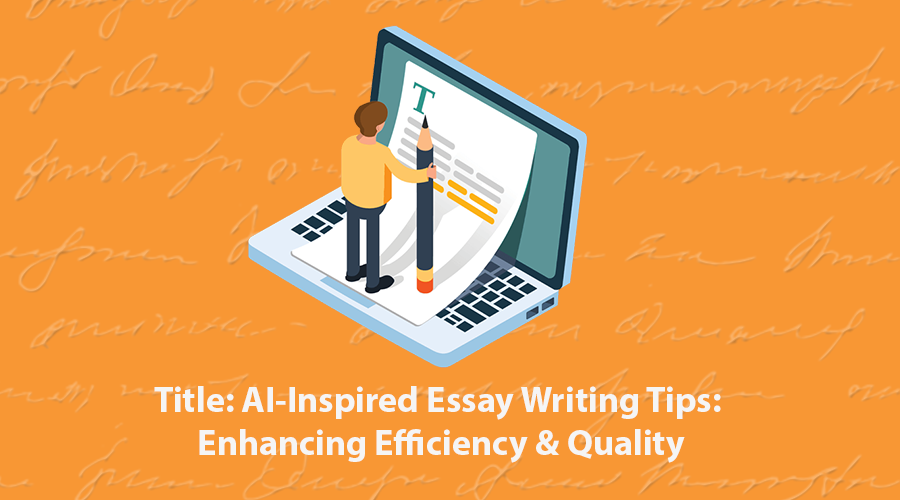
Few innovations in the expansive realm of technology have been as transformative and influential as artificial intelligence (AI). From revolutionizing industries to redefining the way we interact with the digital world, AI's fingerprints can be seen almost everywhere in today's society. Beyond automation, predictive analysis, and even complex problem-solving, AI's influence has seeped into more nuanced domains, one of which is the art of essay writing.
While writing essays has been integral to academic and creative exploration for centuries, the methodologies and techniques have evolved significantly. In this digital age, introducing tools like the AI essay generator from essay-generator.ai and traditional writing practices offers a fresh perspective, allowing writers to reimagine and reinvent their approach. This fusion streamlines the writing process and aims to elevate the end product's quality, coherence, and impact.
With the promise of AI transforming every keystroke into a symphony of words and ideas, it's an exciting time to delve into essay writing. Through this article, we will unearth how AI-inspired strategies can reshape the essay writing landscape, providing both novices and seasoned writers with invaluable tools and insights to refine their craft. Let's embark on this enlightening journey, marrying the best of human creativity with the precision of artificial intelligence.
1. Planning is Essential
AI Approach: Just as an AI system functions optimally with structured data, the human brain, too, benefits from a well-organized plan. Planning acts as the coding phase for writers, allowing for a smoother execution later.
Tip: Set aside dedicated time for brainstorming. Jot down your primary ideas and arrange them in a logical sequence. This initial investment of time will pay off, ensuring you have a clear path forward, reducing the likelihood of writer's block, and ensuring your essay remains coherent.
2. Clarity over Complexity
AI Approach: AI algorithms prioritize clarity. They function best with unambiguous commands and crisp information.
Tip: Flaunting an extensive vocabulary is tempting, but simplicity often carries the day. Your audience will appreciate clear and straightforward communication, which allows your main points to shine through without getting lost in linguistic gymnastics.
3. Use Reliable Sources
AI Approach: Garbage in, garbage out. An AI system's performance is contingent on the quality of the input data.
Tip: A well-researched essay stands out. Dive deep into credible journals, books, and reputable online sources. Remember to cite your sources correctly. Accurate referencing bolsters your essay's credibility and demonstrates your academic integrity.
4. Be Objective and Avoid Bias
AI Approach: A well-designed AI model thrives on objectivity, making unbiased decisions based on raw data.
Tip: Embrace a holistic approach. Present various sides of an argument, even if you don't necessarily agree with them. You demonstrate depth in your research and fairness in your analysis by showcasing diverse perspectives.
5. Iterate and Improve
AI Approach: Machine learning models improve over time, learning from every iteration.
Tip: Write a draft, step away, and come back with fresh eyes. Revisiting your work allows you to spot areas of improvement, refine arguments, and enhance overall readability. This cyclical process mirrors the machine learning approach and ensures consistent growth in your writing prowess.
6. Utilize AI Tools
Modern advancements have given rise to AI-powered writing tools. These platforms, equipped with sophisticated algorithms, can point out grammatical errors, suggest style improvements, and even gauge the tone of your content.
Tip: Integrate tools like Grammarly or Hemingway Editor into your writing routine. These AI companions can act as your first line of review, ensuring your essay is well-polished before human eyes see it.
7. Stay Updated and Relevant
AI Approach: AI algorithms frequently update their databases with fresh information to remain efficient.
Tip: The world is dynamic, and so should be your knowledge base. Ensure your data is contemporary, especially if your essay touches on current events or recent scientific advancements. A well-informed article resonates more with readers and underscores your commitment to staying abreast of developments.
8. Avoid Plagiarism
AI Approach: Value creation is at the heart of AI. Replicating without adding unique value diminishes the essence of AI models and essays.
Tip: As you research, rephrase insights in your own words. While tools can check for Plagiarism, genuine understanding and original expression will always separate your essay.
9. Seek Feedback
AI Approach: Feedback loops are crucial in refining AI processes.
Tip: Share your drafts with peers or mentors. They can provide new perspectives, catch overlooked errors, and offer valuable insights that can elevate the quality of your essay.
10. Conclusion is Key
AI Approach: AIs often summarize their processes, focusing on the core outcome.
Tip: Your concluding paragraph should encapsulate the essence of your essay. It's the final touchpoint with your reader, making it a crucial component in leaving a lasting impression.
In Conclusion
Integrating AI-inspired techniques into essay writing marks a pivotal moment in the evolution of academic and creative expression. By amalgamating the efficiency, precision, and data-driven nature of AI with the inherent creativity and critical thinking of humans, we unlock a new paradigm of writing. This harmonious blend ensures that essays are rich in content and structured, coherent, and tailored to resonate with readers.
As we stand at the crossroads of traditional methodologies and cutting-edge technological advancements, we must recognize the value of such interdisciplinary collaboration. AI doesn't aim to replace the human touch in writing; instead, it seeks to enhance it, guiding writers toward more refined articulation of their thoughts.
Moreover, with the continuous advancements in AI, we can anticipate further enhancements in the writing process. The future promises tools that might offer real-time Feedback, deeper content analysis, or even insights into reader behavior.
These developments, coupled with a writer's unique voice and perspective, will elevate the art of essay writing to unprecedented heights.
In the grand tapestry of academic and creative pursuits, essay writing holds a unique position, allowing individuals to explore, reflect, and communicate. With the insights and tools offered by AI, this process is set to become more intuitive, effective, and impactful. As writers, embracing these advancements and learning to harness their potential will undoubtedly pave the way for more prosperous, engaging narratives and discourses in the coming years.




